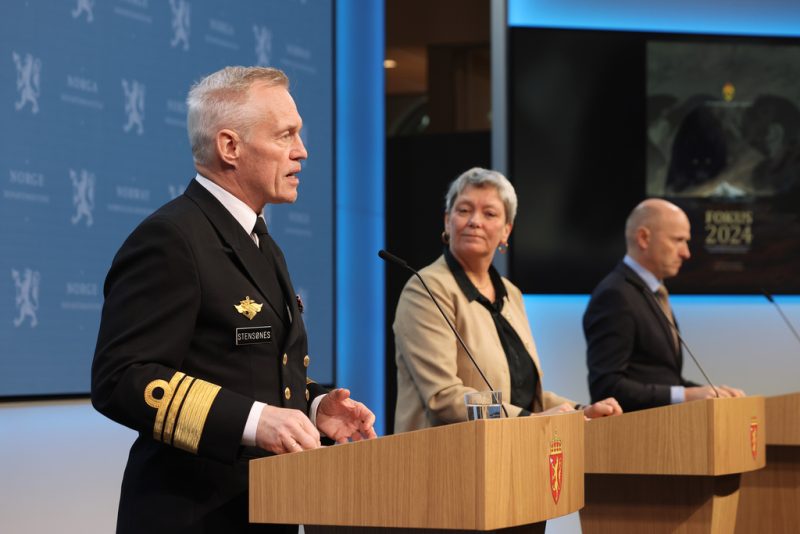Norway’s national security- and intelligence agencies released their evaluations of threats against Norway on Monday, and they’re the highest and most serious in decades. China and Norway’s neighbouring Russia still pose the biggest threats, they claim, while the threat of terrorist attacks is “moderate.”

The evaluations come from Norway’s foreign- and military intelligence agency E-tjenesten (Norwegian Intelligence Service, NIS), its domestic police intelligence agency PST and its National Security Agency, NSM. Their chiefs gathered along with the Norwegian defense- and justice ministers to put forth their national threat evaluations for 2024.
They’ve all grown more ominous than they were just a year ago. “Developments have unfortunately gone in the wrong direction,” said NIS chief and vice admiral Nils Andreas Stensønes. “It’s a more dangerous situation now than it was at the beginning of 2023.”
He and his fellow intelligence chiefs prefer to call their reports “assessments of current security challenges,” but their message was clear: Russia appears to be “stronger” now in its war against Ukraine than it was a year ago, while cooperation among authoritarian and non-democratic nations is spreading. They want “to challenge the West’s dominance, as they put it,” Stensønes said at a joint press conference with PST and NSM.
“Russian military production is in high gear,” writes NIS in its annual threat evaluation, while “China, Belarus, Iran and North Korea are offering “considerable material support” for Russia. That boosts the military threat “to Norway’s sovereignty, its people, territory, public functions and infrastructure.”
At the same time, Israel’s war on Gaza has created more catastrophe and uncertainty in the Middle East, while China is keen to protect its trade and economic position in the world. Norwegian Foreign Minister Espen Barth Eide just returned from a diplomatic visit to China where he found some common ground over China’s support for Palestinians and peace in the Middle East.

Norway’s intellingence experts warn nonetheless that China mostly wants more control over its production and trade of exports, that its relations with western nations are tense and China seeks more influence in the Arctic. PST warns that China, like Russia, can thus use its vessels as spy ships also in Norwegian waters. PST also warned that China can send spies to Norway disguised as researchers or business consultants keen on infliltrating key Norwegian companies, especially in the energy sector. Both China and Russia are still believed to be behind the majority of cyber attacks on Norwegian targets. Officials at their respective embassies in Oslo either scoffed at such allegations or refused to respond to them.
Russia is especially believed to be targeting Norwegian technology, individuals and organizations working with weapons donations to Ukraine and training of Ukrainian personnel, companies involved in the oil and gas industry, and allied defense operations in Norway. PST chief Beate Gangås also worries that Norwegian politicians and political processes are targets of Russian espionage operations. The Russians have little to lose, since diplomatic relations between Norway and Russia froze when Russian President Vladimir Putin ordered Russia’s invasion of Ukraine. That means the Russians “will be willing to take greater risks.” That can also include sabotage operations within Norway, she warned.
Asked whether this all may be building up to a third world war, Stensønes told Norwegian Broadcasting (NRK) that “we must be honest and say that the security and political situation is more dangerous, with negative development regarding threats to Norway and Europe.” He thinks it’s “very positive,” though, that Sweden and Finland are joining NATO because “that definitely strenthens Norwegian security.” Russia’s invasion of Ukraine has also brought the west “tighter together,” and that further strengthens NATO.
Leaders of the three agencies also noted that cyber security within Norway is steadily improving and become a high priority in both the public and private sectors. Earlier threats of terror from extremist Islamic extremists have also declined slightly, to the “moderate” level, and NIS has had some success infiltrating extremist networks.
Russia’s war on Ukraine continues to have the greatest impact on national security, however. Prime Minister Jonas Gahr Støre stressed in his New Year’s speech early last month that Norway poses no threat to Russia, noting that for centuries the two countries were good neighbours in the north, even during the Cold War. Now, however, Norway views Russia as an aggressive bully while Russia views Norway as part of its western enemies. Russia’s war on Ukraine will be decisive, Stensønes believes: “A Russia that gets control over its economy, revitalizes rusting industry and succeeds militarily will have greater belief in the use of military power than a Russia that comes out of the war without having gained much,” he told NRK.
“Norway is a safe country and the danger for a regular invasion is low,” he added, “but we must be prepared for greater uncertainy, follow developments closely and be able to react faster than there was need for a few years ago. National security is everyone’s responsibility.”
NewsinEnglish.no/Nina Berglund

